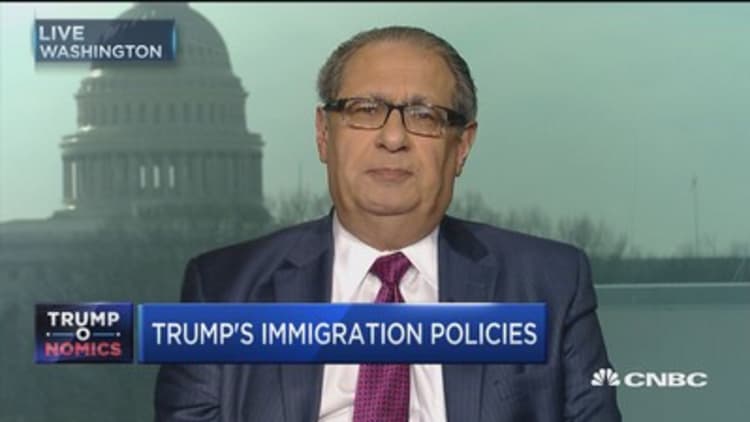
President Donald Trump's immigration order could set a dangerous precedent for immigrants seeking to enter the United States from countries other than the seven listed in the ban, Aneesh Chopra, former U.S. chief technology officer, said Wednesday.
"The executive order makes it explicit that [policymakers] may look beyond these ... seven countries. It sets the precedent with these seven. And has … explicit instructions to the team to look anywhere under any circumstance. And so the problem is not just the seven countries, although they're not insignificant," Chopra told CNBC's "Squawk on the Street."
Chopra, the first-ever U.S. CTO, said that if followed, the order's detrimental economic effects could outweigh any protection the administration insists it provides.
"The costs to the economy are far greater than the added benefits to security for this shift in how we handle immigration procedures," the former Obama aide continued.
Chopra, the first-ever U.S. CTO, said that if the order is backed by the courts, it could have a "terrible effect" on what he called the country's "long-term economic dynamism."
It would also make recruiting more difficult, in turn pushing technology companies that actively seek high-skilled workers to pursue that talent abroad, he said.
"More research and development centers of excellence will likely locate outside of the country in this period of uncertainty," Chopra said. "You [have] to take the talent that's out there and apply the best talent to the problems. And if you can't bring the talent here, you're going to have to invest elsewhere and locate those talent centers elsewhere. And that's terrible for the country."
And while technology giants may be the hardest hit, they won't be the only industries feeling the brunt of the order's effects, said AMIDEAST President Theodore Kattouf.
Kattouf was also a U.S. ambassador to the United Arab Emirates under President Bill Clinton, and to Syria under President George W. Bush.
"I doubt many of your viewers know that we have about 6,000 Syrian doctors practicing medicine in this country who were born in Syria, got their medical degrees in Syria and then came here on medical residencies, and often work in areas where there are very few doctors serving the communities," Kattouf told "Squawk on the Street" on Wednesday.
Beyond that, Kattouf's organization AMIDEAST gives thousands of students from the Middle East and North Africa the opportunity to study in the United States on scholarships.
"They study here, they get a good education, they get exposed to American values, and I think it's a win-win. I would note that President George W. Bush and the late king of Saudi Arabia, King Abdullah, agreed to bring tens of thousands of Saudi students here. And let's face it, the Saudis were the prime perpetrators of 9/11," Kattouf said, noting that he meant Saudi individuals, not their government.
"And yet we've had 80,000 Saudi students at one time in this country [and] nobody said anything," he added.
Trump defended the order on Wednesday, saying it was made quickly to prevent terrorism. His administration has repeatedly said it was issued hastily to prevent potential threats from "pouring in" to the U.S., but has provided no evidence of heightened risk.


